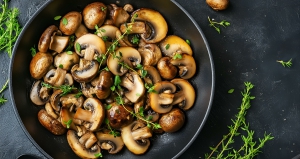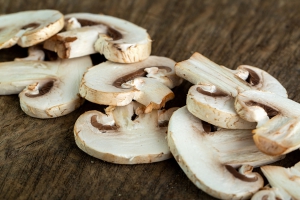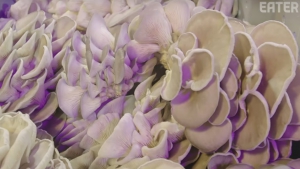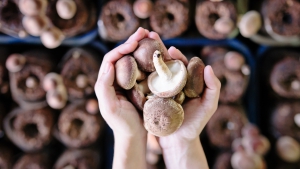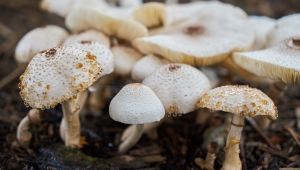Mushrooms are earth’s favorite ingredient
When it comes to sustainable eating, mushrooms are the ultimate MVP. Not only do they add savory umami flavor and rich meaty texture to your favorite dishes but their growing process has a remarkably low environmental footprint. In fact, according to a study by SureHarvest, mushrooms are considered “one of the most sustainably produced foods in the U.S.,”1 making them a perfect ingredient to celebrate Earth Month.
Small Footprint, Big Impact
Mushrooms are grown using minimal resources, so growers are able to produce millions of pounds of mushrooms on just a few acres of land.1 Soil used to produce mushrooms is made of pasteurized composted materials transforming what would be waste into nutrient-rich food. Producing one pound of mushrooms:
- Requires only 1.8 gallons of water1
- Generates only 0.7 lbs of CO2 equivalents1
- Requires only 1.0 KWH of electricity1
Once mushrooms are harvested, this soil can be repurposed in multiple ways. One way it is used is as potting soil, enriching it with beneficial nutrients and organic matter to support enhanced plant growth. This full-circle approach minimizes waste, enhances soil health and contributes to a more sustainable food system.
Healthy on the Plate, Gentle on the Planet
Mushrooms aren’t just good for the earth, they’re a superfood source of nutrients, too. A rich umami flavor and meaty texture make them a perfect plant-based pairing with vegetables, grains and proteins.
You can read this interesting article further on Mushroom Concil
RibbStyle attending NAMC in Las Vegas
It’s time North America unlocks unparalleled hygiene and yield in mushroom cultivation.
At @Ribbstyle, they are revolutionizing the industry with their airtight and vapourtight coatings, designed to significantly improve hygiene and prevent contamination in grower and distributor facilities throughout the mushroom and fruit industries.
This February 26th-29th, their team is attending the @American Mushroom Institute’s North American Mushroom Conference (NAMC) in Las Vegas to introduce their innovations to new partners, learn about market challenges, and build new long-term relationships.
Why Ribbstyle is a game-changer for your cultivation:
✔️ Tailored Solutions: Our coatings are not one-size-fits-all. They're specifically engineered to meet the unique needs of mushroom growers, enhancing safety and productivity.
✔️ Deep Dive Into Challenges: We're coming to learn and to listen, ready to understand the hurdles U.S. growers face and discuss how our targeted solutions can overcome them.
✔️ Industry Leaders: With Ribbstyle, you're partnering with pioneers in coating technology. Our focus on safety, sustainability, and efficiency in cultivation practices makes us the ultimate strategic allies.
If you're exploring ways to advance your operations and will be at NAMC, connect with Ribbstyle while they are at the conference.
Source: RibbStyle
Plant-based meat products served out-of-home grow by almost 50% across Europe’s ‘Big 5’ countries
- Sizzling 90% growth for plant-based burgers, while sales of sandwiches fall
- Annual consumer spend finally exceeds pre-COVID 19 levels, but visits to OOH hospitality venues remain lower at -10%
- 25% of Europe’s Big 5 population follow a flexitarian diet – a trend that is set to grow in 2024
BRACKNELL, UK – 8 November 2023 – According to research from Circana, the leading advisor on consumer complexity that formerly traded as IRI and The NPD Group, the trend towards eating alternative plant-based meat protein products in out- of-home (OOH) eateries, such as quick-service restaurants (QSR), cafes, pubs and bars has increased by 48% in servings compared to 2019 across Europe’s ‘Big 5’ countries. While in other food protein categories, the number of total product servings declined, including Beef (-5%), Pork (-16%), Chicken (-5%), Fish/Seafood (-13%) and Other Meat (-20%).
Typically made from ingredients such as soy, peas, lentils and mushrooms, plant-based products have gained popularity in recent years as fast-food chains and restaurants throughout Europe cater to growing consumer demands for sustainable, healthier and cruelty-free menu options. When asked about factors influencing their choice of where to eat out, 45% of consumers overall said they are more loyal to restaurants that care about sustainability, with Italy voicing the strongest concern (56%) followed by Spain (49%) and the UK least concerned (38%).
Burgers buck the trend
Compared with other protein categories, plant-based meat has shown the strongest growth across all formats since 2019. The overall number of servings across each protein category has dropped with one exception – burgers. While the number of servings in other formats, such as sandwiches and wraps, have declined, the burger has shown solid growth (Beef +4%, Chicken +16%, Fish +11%, Other Meat +14%).
Despite the overall decline in visits to OOH venues, plant-based burgers grew significantly by +90% during year ending August 2023 vs 2019, and +20% year-on-year ending Aug 2023, representing a quarter (25%) of the total contribution made to growth in burgers.
Please read the full article here.
Source photo: Kent Wild Life Trust
Flavor-enhancing properties of mushrooms
A new study from the Culinary Institute of America and University of California-Davis, published in the Journal of Food Science, explored the flavor-enhancing properties of mushrooms and found that blending finely chopped mushrooms with ground meat enhances flavor and nutrition.
The study, Flavor-Enhancing Properties of Mushrooms in Meat-Based Dishes in Which Sodium Has Been Reduced and Meat Has Been Partially Substituted with Mushrooms, conducted by University of California Davis (UC Davis) and the Culinary Institute of America (CIA) was published in the Journal of Food Science.
Please read the full study overview here.
Students develop potato chips based on mushrooms
In May 2020, the Shiitake Biltong team from Maastricht took part in the student competition Ecotrophelia. They have continued to develop new food products. Soon they hope to start their own company that will enter the market with potato chips based on mushrooms.
For Ecotrophelia, the group of Maastricht students presented a vegetarian variant of the biltong which is popular in South Africa; a snack consisting of dried strips of meat that resembles beef jerky. The students won the Dutch final with it and were also allowed to present the idea during the European final.
After the team took another critical look at the idea, the students came to the conclusion that shiitake as a raw material was not such a smart choice. Good shiitake is hard to get and must be imported from Asia. That is expensive and not really sustainable.
The team went back to work and now opted for raw materials from a Dutch residual flow. They developed mushrooms based on pieces of sliced mushrooms. The idea has been elaborated in a business plan, contacts have been made with suppliers, buyers and a possible producer. At this time the production process is optimized and the students are about to start their own company.
Source: Foodholland (article is in Dutch)
Adidas has announced it’s launching a line of sneakers made from mushroom-based leather.
As part of a 2021 sustainability initiative from Europe’s largest sportswear manufacturer, the new Stan Smiths will be entirely vegan, and created using mycelium: that is, the vegetative part of fungi that produces mushrooms.
On December 28, the German multinational announced that “adidas seeks to break new ground: Together with partners, adidas is developing a new material, a purely biological leather alternative made from mycelium, and will use it for the very first time in the creation of footwear.”
This isn’t the company’s first foray into vegan footwear. In 2020, Adidas launched plant-based versions of several classic sneakers, which quickly became bestsellers. Now it’s completely renounced the use of fur in all products, and it’s working with partners on other sustainability projects that include recycling cotton and developing a “particularly climate-friendly running shoe” as part of a drive that will see 60% of all Adidas products in 2021 being made with sustainable materials.
Please read the full article here.
Source: Good News Network
You can find lion’s mane, royal trumpets, and blue oysters at NYC’s only mushroom farm.
“There are so many reasons why I love mushrooms,” says Andrew Carter, co-founder and CEO of Smallhold farms in Brooklyn. “At its base level, they grow off of waste streams. It’s not very common to find a product that’s as ecologically sustainable that can also feed so many people,” says Carter. “Mushrooms, I think, are going to feed the world.”
This urban macro farm specializes in creating artificial environments for growing rare and unique mushrooms for local restaurants and grocers. Each environment gets strategic temperature, humidity, and lighting adjustments throughout the day. The team cultivates unique varieties like lion’s mane, pink oysters, and royal trumpets in their macrofarm, while also using mini farms in buildings all across the city.
With their unique growing methods, sustainable packaging, and supply chain to many of New York City’s best restaurants and grocers, Smallhold’s goal is to open people’s minds to using mushrooms in more cooking, while creating sustainable farms in multiple cities nationwide. “We want this to be the center of the plate,” says Carter as he packs a box with different varieties. “We believe by giving people more mushrooms, people will eat more mushrooms, and they might replace that hamburger or steak with a bunch of different mushrooms.”
By Terri Ciccone | Eater.com

In a few words we wish to describe to you what e-nema does, for whom and why.
E-nema is commited to solve one of the fundamental issues in agriculture and development: the use of chemical pesticides.
E-nema GmbH is a successful company and market leader in the production of nematodes and represents the biological alternative to chemical insect control. Therefore e-nema combines cutting-edge technology and biological crop protection, always with the aim of making the world a better place.
In 1997 e-nema was founded in Schwentinental Germany by the three partners Prof. Dr. Ralf-Udo Ehlers, Dr. Arne Peters and Tillmann Frank to make a contribution to the compatibility of plant protection and nature conservation. With the product nemycel®, e-nema offers the biological alternative for controlling Sciarid in mushrooms. nemycel® contains the insect pathogenic nematode Steinernema feltiae. Nematodes are roundworms that are natural enemies of Sciarid fly larvae.
Nemycel is as easily applied as any chemical pesticide, but it is much more effective and environmentally friendly!
An international team works in the company's laboratories, on continually improving processes and products as well as developing new ideas and solutions for plant protection, aquaculture and in biocatalysis, the 'white' biotechnology. For further information or to contact e-nema, please visit their website. please visit their website.
So Much Fungi
It shouldn’t be a surprise that humble mushrooms, fungi that feed on decaying matter, are such a popular ingredient throughout many of the world’s cuisines. After all, mold and yeast, two basic fungi, are responsible for turning milk into blue cheese, wheat into bread and, of course, grape juice into wine. Mushrooms can have a similar transformative effect on food, lending a deep savory character to all sorts of dishes. This intangible quality is often called “meaty,” but mushrooms have several distinct flavor components that make them a natural partner for wine.
Earthy
Few foods are as earthy as mushrooms, which often taste like the soil in which they grow. If this quality appeals to you, pick a wine that will tease it out, rather than overwhelm it. Red Burgundy from the Côte de Nuits is a great earthy expression of Pinot Noir with mushroom-like undertones.
Peppery
Many mushrooms, especially when raw, have a subtle peppery, throat-tickling quality akin to that of radishes. Tannins can accentuate this sensation in an unpleasant way, so try a rich white wine to smooth it out. As it ages, Rioja Blanco develops nutty, caramelized aromas and an almost creamy texture that match beautifully with mushrooms.
Read the full article here.
Source: Wine Enthusiast, by Nils Bernstein
- Fungus can cure disease - 1929 Penicillin, an antibiotic was produced from a mold called ‘Penicillium Chrysogenum’ that is also a fungus.
- Fungi cell walls are made of chitin, not cellulose like plants.
- Mushrooms are more like people than plants. They have their own immune system that can produce vitamin D when exposed to sunlight.
- Mushrooms are almost entirely made of water and are excellent sources of B vitamins, selenium, and vitamin K.
- There are over 70,000 known species of fungus.
- The largest fungus on the planet is a honey mushroom in the Blue Mountains of Oregon stretching across 2384 acres and is estimated to be between 2400 and 8650 years old!
- At least 350 species are consumed as food.
- Mushrooms can be made into boards, fibers, even boats.
- A fungus has been discovered that breaks down plastic in weeks instead of years.
- Some mushrooms can breathe; Ganoderma Lucidum commonly known as the lingzi mushroom, respires oxygen in and carbon dioxide out.














